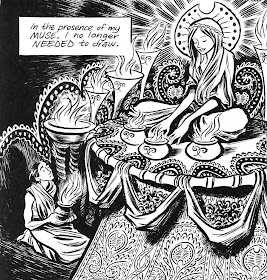Craig Thompson's Blankets.
It's Valentine's Day. A day, as Lisa Simpson might say, honouring a saint who was gruesomely killed then buried by the side of the road. Perhaps fittingly, St. Valentine refers to three different people, a priest, a bishop and a martyr who was lost in Africa. Pick your poison. The messiness of the holiday may derive from the fact that the Catholic Church probably superimposed the holiday over the ancient pastoral health and fertility festival of Lupercalia, which was observed in Roman and pre-Roman civilizations. This festival was later dressed up in courtly love conventions derived from the late medieval and early Renaissance periods. Those conventions are now tied to marketing and spending money. So how do we get back to the fundamentals and remember what love is all about?
Whether you are happily paired off, or single and eating chocolate and doing your best to ignore this day, almost everyone can agree on that little corner of memory they keep reserved for the one that got away or for 'the one.' One of the best recent and most touching tributes to this kind of first love that I've seen is Craig Thompson's 2003 graphic novel, Blankets
When I read it, I felt that Blankets got it right. And the reviewers were correct. The blend of image and narrative created a momentum that gave the very act of reading a sensation paralleling the unfolding of love. The strip conveyed how love develops and easily exposes lovers' vulnerabilities. It let the reader grasp the fear and pockets of uncertainty, the ebb and flow of communication that build intimacy and trust. Ultimately, the story captured the riveting, transformative, breathless beauty of first love, a fleeting and riveting experience that is never lost. It is also dedicated to showing how love transforms lovers - changing them, pulling them out of their worlds, turning them into different people. If you want to contemplate love, read Blankets.Thompson has said that the novel grew out of a simple idea: to describe what it feels like to sleep next to someone for the first time. In 2005, Time chose it as one of the 10 best English language, graphic novels ever written. ... Most critics considered it a milestone in the progress of the American graphic novel, not only in length but also in visual grace and technique. Critics have further hailed it as one of the best graphic novels in recent years, claiming that the book will be remembered for its superb execution a decade after publication. The Bloomsbury Review called it "a superb example of the art of cartooning: the blending of word and picture to achieve an effect that neither is capable of without the other." Time stated that Thompson's work "has set new bars for the medium not just in length, but breadth."
Blankets uncannily rings true in another respect: it is a coming-of-age autobiographical account from a Gen Xer who grew up in a strict fundamentalist Christian home in Wisconsin in the mid-1980s through the 1990s. It wrestles with loss of faith right at the moment when love gives Thompson everything to believe in.
The novel relates a Generation X experience that confirms the symbols around that generation, but gives the slackers' clichéed youth very different, intimate meanings that accurately convey many of that cohort's deepest sensibilities. If you are a Gen Xer, even if your childhood was nothing like Thompson's, I'll wager you'll instantly recognize the path he walks in Blankets.
In the end, the graphic novel closes with the notion that love allows dreams to become real. But as dreams of love inevitably and painfully fade back to their original state, they give us the vision and strength to make our own mark upon reality.
All images from Blankets are the property and copyright © Craig Thompson (2003) and are reproduced here solely for the purposes of discussion and review. To buy Blankets, go here
For my other posts on Love in the New Millennium, go here.
For all my posts on comics, go here.














No comments:
Post a Comment